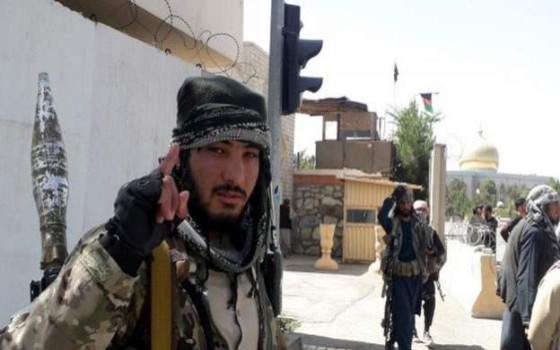
The United Nations: Settlements are required from everyone for Afghanistan to return to the international community. There are 30 million people in need of humanitarian assistance.

- Europe and Arabs
- Thursday , 21 December 2023 16:48 PM GMT
New York: Europe and the Arabs The Special Representative of the Secretary-General in Afghanistan, Rosa Otunbayeva, called for increased direct engagement with the de facto authorities in the country, but stressed that accepting international rules and standards and working to support them “will remain a non-negotiable condition for obtaining a seat at the United Nations.” According to what was stated in the daily United Nations news bulletin, a copy of which we received this morning
In her speech before the Security Council on Wednesday, Ms. Otunbayeva said that the international community must benefit more from the willingness of the de facto authorities to engage in dialogue, noting that dialogue “does not confer legitimacy, but rather can be used to express objection and encourage change.” Despite the impasse that women's rights have reached in the country, she said that the United Nations Mission in Afghanistan (UNAMA) interacted successfully with the authorities on other issues such as climate, smallholder financing, drug control, mine clearance, private sector development, and human rights. and governance – directly affecting the lives of millions of Afghans. However, the Head of Mission acknowledged that the human rights situation in the country was marred by systematic discrimination against women and girls, suppression of political opposition and freedom of expression, lack of meaningful representation of minorities, continuing cases of extrajudicial killings, arbitrary arrests and detentions, and torture and ill-treatment. Relationship with Pakistan Ms. Otunbayeva also highlighted the deep concern felt by countries in the region about potential threats from within Afghanistan, in particular Pakistan's firm conviction that the de facto authorities have not done enough to contain the Taliban-Pakistan, which has claimed responsibility for recent major terrorist attacks. She added that Pakistan's new policy of returning illegal Afghans living in the country has led to a deterioration in relations between the two sides, calling on Kabul and Islamabad to work on issues of common concern. A clear path back The Special Representative touched on the independent assessment recently presented by the United Nations Special Coordinator for Afghanistan, Feridun Sinirlioglu, and said that it provides a “clear-cut endpoint” for the full reintegration of the Afghan state into the international system in accordance with international law. She pointed out that the de facto authorities' insistence that the ban on girls' education and women's work is an internal matter could lead to "prolonging the impasse that the evaluation aims to resolve." She stressed that the de facto authorities need to “understand the value of the multilateral offer presented to them by the Special Coordinator,” which raises the issue of Afghanistan at a time when other issues occupy the priorities of the international agenda and “shows a path to a final solution to Afghanistan’s relationship with the international community,” stressing “Settlements will be required from all parties.” Standard levels of needs The Council also heard a briefing from the Director of the Coordination Division of the Office for the Coordination of Humanitarian Affairs (OCHA), Ramesh Rajasingham, who said that humanitarian needs continue to rise to record levels in Afghanistan. He noted that there are more than 29 million people in need of humanitarian assistance - representing one million more people than in January and a 340 percent increase in the past five years. Mr. Rajasingham said the situation was exacerbated by new developments, including the earthquakes that struck Herat province in October, which damaged more than 40,000 homes affecting 275,000 people, and the return of more than 450,000 Afghans from Pakistan following the government's announcement. On the return of “illegal aliens” as of November 1. He added in this context: “Their sudden arrival could have far-reaching consequences for the entire country unless sustained and joint assistance is received with the support of the international community.” Continuing oppression of women Additionally, the OCHA official highlighted the needs of women and girls in Afghanistan, which continued to grow “at a scale and intensity commensurate with the repressive approach of the de facto authorities.” He said that girls and women have been marginalized from all forms of public life for almost two years, systematically denied access to secondary and tertiary education, restricted in their movements, and blocked in their ability to work, including in the humanitarian sector. He added: “Partners reported that documents signed by Afghan women, or projects indicating women beneficiaries, were also rejected, and some local agreements allowing Afghan women to participate in humanitarian work were canceled by de facto authorities after they had been secured.” However, Mr. Rajasingham noted that there is some practical cooperation with de facto authorities at the local level that enables Afghan women to participate in humanitarian work, noting the resumption of some humanitarian programs that were initially suspended due to the ban and the work of about a third of humanitarian organizations and organizations that Led by women and now employing Afghan women and men at full capacity. Rajasingham said that the humanitarian community is continuing to work in Afghanistan, but “we cannot be the solution,” stressing that the Afghan people need sustainable solutions and a long-term approach that “takes them beyond mere survival: solutions that support income generation, agriculture, and the ability to Adapting to climate change and restoring basic services. Before the meeting, the Ecuadorian Ambassador and current President of the Security Council, José de la Gasca, read a statement on behalf of current and incoming members of the Council who signed the Statement of Shared Commitments to the Principle of Women, Peace and Security. In their statement, the 15 countries called on the Taliban to end “systematic gender discrimination” by removing the strict restrictions imposed on Afghan women and girls.












No Comments Found